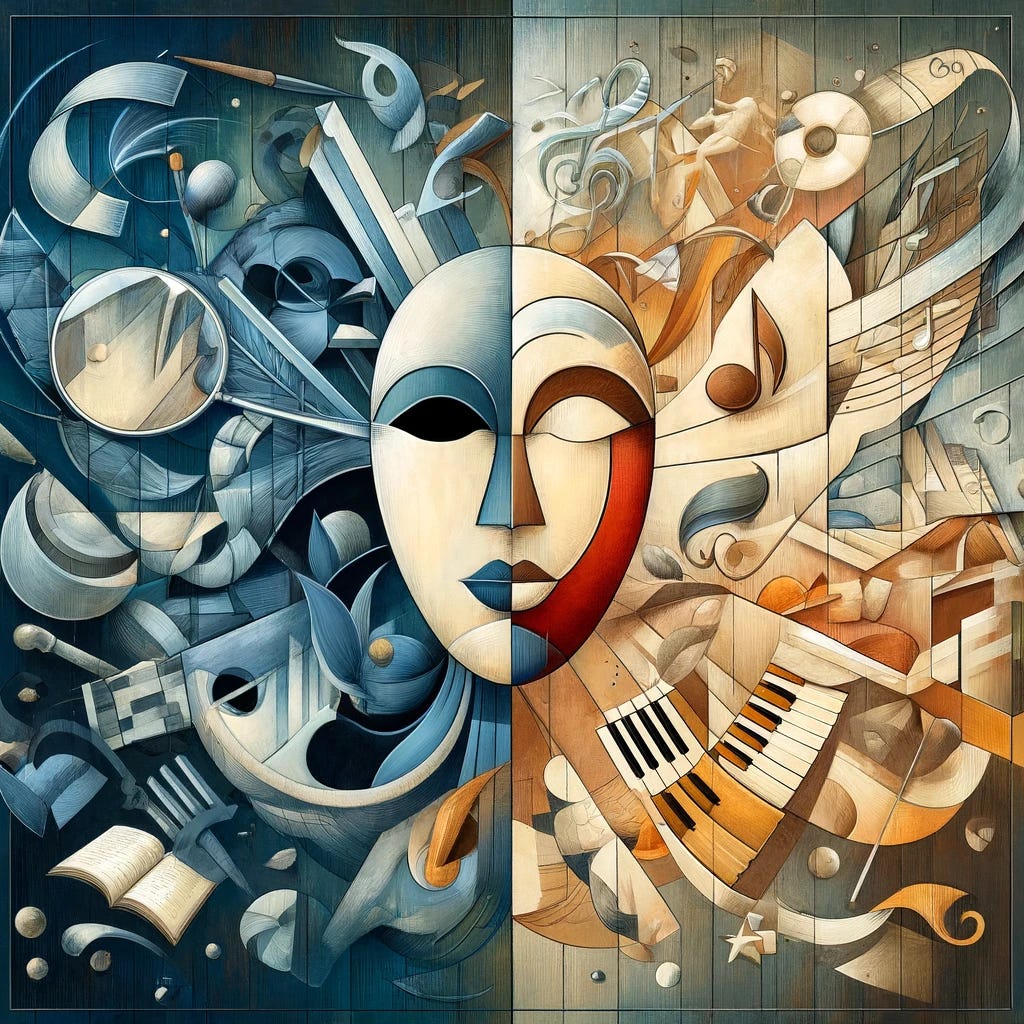During its run critics largely struggled with how to interpret Here We Are. They wanted to honor it as Sondheim's final work, but the show seems antagonistic to all musical theater conventions. The songs seem deliberately non-extractive—none of our main characters (the biggest stars) have solos, and it’s hard to imagine hearing "The Road Part 2" in a Sondheim revue. Then, the music just ends in Act Two, and while it was said to be a choice, Sondheim’s death makes this convenient—is this thing even done?
It should come as no surprise that I'm on the "this is a complete and intentional work" side of the divide. While it makes sense to question the work, I’d argue that many of the problems critics identified stem from approaching the work with a postmodern lens that expected parody and thus missed the metamodern parable actually presented. Although most critics praised the music, few accepted that after the characters were entrapped, the play was best served by the music exiting the play. Nearly every review longed for the play that "could be," obscuring the play that is.
For example, in the Vulture review The Last Midnight: Sondheim and Ives's Here We Are, reviewer Sara Holdren seems willing to accept that the music leaving Act Two was a conscious choice but appears unwilling to accept it as the correct one. She quotes director Joe Mantello's observation that “these characters expressing themselves in a conventional musical-theater way would be deeply unsatisfying and detract from the story” and then wonders what an "unconventional musical-theater way forward" through Act Two might look like. Of course, in doing so, she misidentifies the poles of the axes—music brings with it conventions that the characters can escape into. The suggestion is unstable, a conventional approach disguised as an unconventional approach, capable of approximating meaning but never arriving at it. This mirrors the group's experiences at Osteria Zeno.
Even reviewers with more positive feedback can't seem to help but bring along their preconceptions of what a new Sondheim show would entail. In the New York Stage Review's Here We Are: A Minor but Welcome Final Addition to the Sondheim Canon, Frank Scheck describes the bishop's song as "delightfully playful," with lyrics reminiscent of Sweeney Todd's "A Little Priest." They highlight the witty wordplay and nostalgic callbacks, suggesting that Sondheim fanatics might even create drinking games around these references. This perspective reflects a tendency to engage with the material through a lens of deconstruction and nostalgia, focusing on familiar elements rather than the thematic depth of the new work. This is the pseudo Sondheimian "Jukebox musical" of Café Everything in action.
Variety's Naveen Kumar, however, wanted the play to be a bit more bloodthirsty. In ‘Here We Are’ Review: Sondheim’s Final Musical Is a Surreal and Starry Feast, Kumar laments that Here We Are delights in the flavor of its vapid jet-sets but ultimately spits them out in a resolution that betrays its own internal logic. It’s too much, and robs the show of its potential teeth.” This perspective reveals a desire for the show to be brutal in its depiction of reality. Maybe they could have a waiter laid out in the back of the theater like in Bistro a la Mode?
I didn’t pull these criticisms out to suggest that these critics did a "bad job" or failed to engage fully with the work—just that these preconceptions limit the perspective of what the show can be, and Sondheim and Ives were aware of it. So much so that they ended up baking it into the show itself.
By projecting and incorporating elements of its own anticipated criticism, Here We Are functions, among other things, as a synthesis of Sondheim's long career of writing musicals and understanding how they get received. This meta-awareness not only underscores the work's completeness but also highlights Sondheim’s acute self-awareness as an artist who continually engaged with and evolved through the reception of his works. The show embodies the metamodern swing between irony and sincerity—ironically pointing out the limitations of theater with the restaurants, yet sincerely integrating these limitations as part of its essence. This duality captures the metamodern essence, making the work both a critique and a celebration of its medium.





